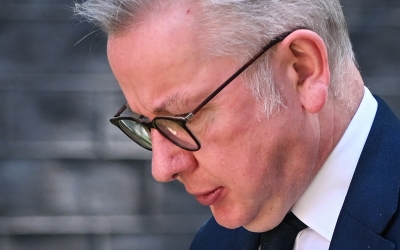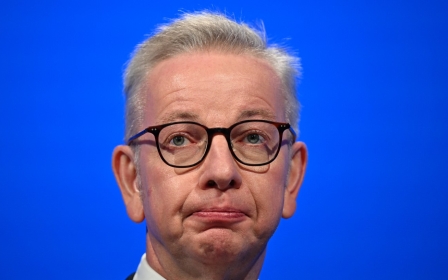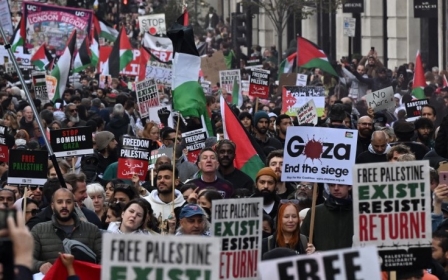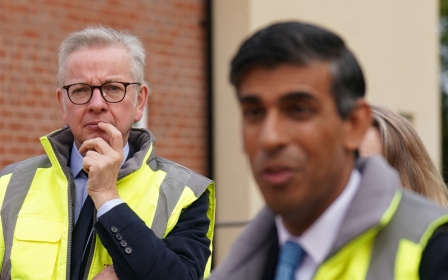UK extremism: Naming and shaming of Muslim groups aims to stifle all dissent
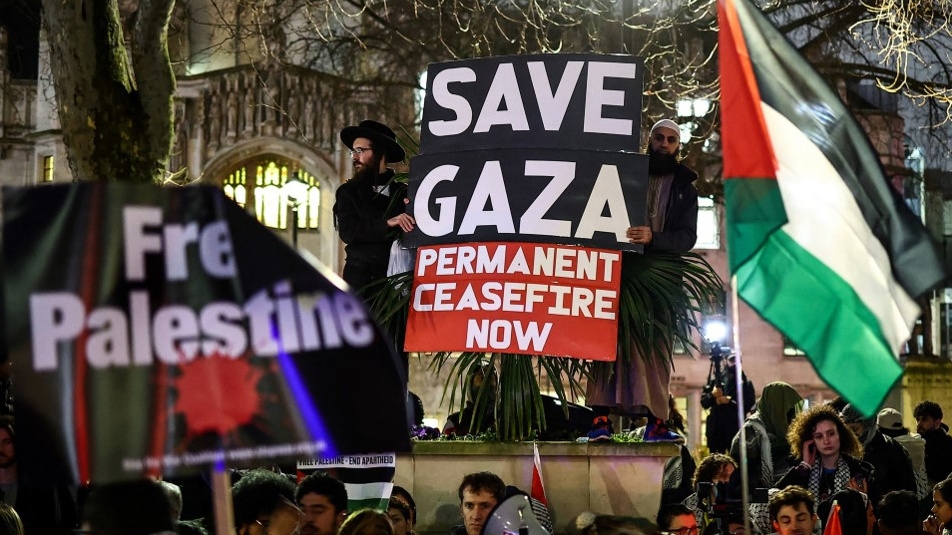
The public naming of Muslim civic actors by British politicians, and marking them out as destabilising threats to the nation, is by now a familiar tactic of assured political expediency.
When Communities Secretary Michael Gove’s heavily trailed speech in parliament came to pass earlier this month, it predictably included the name-checking of grassroots Muslim groups, and of an imam with decades of service to his local community, as potentially falling foul of a definition of extremism that was as vague as ever.
This intervention might well have been, as was stated, somewhat about establishing consistent criteria for engagement across government departments. More significantly, though, it was about buttressing the image of an idealised political sphere, framed by the parameters of a securitised liberal nation-state.
The securitised state needs to be securitised against a threat, and this is where the idea of extremism comes in. Constructed as foreign and antithetical to a supposed natural order of British values, critical Muslim political agency stands no chance.
Gove cited a deferential adherence to liberal democracy, rule of law, and respect for government, but no clear benchmarks have been given as to how an organisation or individual will be assessed to be (in)appropriate for engagement with government.
New MEE newsletter: Jerusalem Dispatch
Sign up to get the latest insights and analysis on Israel-Palestine, alongside Turkey Unpacked and other MEE newsletters
Precisely because it is so nebulous, this definition of extremism, and the associated name-checking, become a tool for chastising Muslim civic actors into choosing between compliance and their ultimate domestication, or dissent and their ultimate banishment from any political space.
The reality is that the notion of British values is no banal, fitra-like concept towards which we all have a natural inclination. It is a politically charged formulation iterated successively by governments to delineate the parameters of political acceptability, as suited to their own agendas.
Sustained protests over Gaza
Gove’s announcement doesn’t signify any real change in policy direction. Rather, it is a politically opportune, grandiose ramping-up of the state’s longstanding vilification of Muslim civic actors, and denigration of Muslim concerns. Its actual impact, in terms of government relations, is little more than a tidying up of loose ends.
There are, however, two key features related to the timing and substance of this development that we would do well to take note of.
Follow Middle East Eye's live coverage of the Israel-Palestine war
Gove’s extremism definition comes amid almost six months of sustained and growing grassroots pro-Palestinian protests, mobilised in response to six months of a sustained and horrific genocidal Israeli onslaught against Gaza. Thousands of people from countless different political persuasions and identities have marched and spoken out, week after week - outraged at the UK government’s continued complicity with this genocide.
In just this short period, several government ministers have disparaged protests as antisemitic “hate marches” and expressions of Islamist “primacy”, and falsely depicted them as a nihilistic disturbance to the public order that threatens social cohesion.
It is no coincidence that the government’s unequivocal ideological commitment to “stand with Israel” is matched by its equally unequivocal obsession with misrepresenting the mounting wave of dissent as the work of rabid, traitorous ideologues.
Gove’s announcement is a politically opportune, grandiose ramping-up of the state’s longstanding vilification of Muslim civic actors
By this logic, popular calls for an end to genocide and an end to the UK’s complicity in it cannot be motivated by ethics, because especially for Muslim activists in the securitised nation-state, British values (read: British state interests) have been prescribed as the only ethics acceptable in the public sphere.
In terms of substance, alongside naming Muslim voices that he considered to be extremist, Gove approvingly mentioned a number of alternative voices.
In my opinion, what is interesting about these alternative voices is that they present a very specific narrative about “conflict in the Middle East”.
This narrative speaks of two neighbouring peoples locked in some sort of perpetual feud, the origins of which have been lost in the mists of time. While interfaith dialogue can be a laudable exercise in education, exchange and bridge-building, its cynical deployment to create orchestrated counter-narratives about Muslims and Jews discovering one another’s humanity through interaction obscures the realities of settler-colonialism and an ongoing occupation enacted with vicious impunity.
Crucially, it deflects attention from the British state’s role and responsibility - both historic and present - and displaces the onus onto community leaders who, it is implied, might hope to alleviate matters through shared charitable projects and tough conversations over cups of tea.
Insidious domestication of Islam
This type of manoeuvring absolves politicians and political structures, in the same breath as it indicts religious communities by utilising them as pawns to be burdened with discharging an impossible and completely inappropriate task.
It is precisely because Muslim grassroots voices are alive to the history and dimensions of this occupation that they set little stock in such initiatives, which demean their experiences, not to mention their intellects and imaginations - containing them by elevating the idea of “getting along” over the ethical goal of saving lives and seeking justice.
Going back to Muslim political agency, this approach not only drowns out, but actively delegitimises and demonises, authentic voices via state-funded astroturfing par excellence. It is thus a prime example of the insidious domestication of Islam in Britain.
In his speech, Gove was at pains to differentiate between Islam (a “great”, “spiritual” and “virtuous” faith) and Islamism (a “totalitarian ideology”). But in truth, this is a coloniser’s distinction, which is not recognised by adherents of the faith.
The recent proscription of the avowedly non-violent Hizb ut-Tahrir illustrates how support for Palestine has been used to criminalise Muslim political voices that dissent from the orthodoxy of liberal democracy.
With regards to Gove’s new “extremism” definition, Muslim voices in the civic space should realise that rather than bringing the clarity he said it would, instead, the defining lines of legitimacy in the eyes of the state will become more blurred and more subjective than ever. An “extremism list” for government agencies is ultimately a signal to wider society that non-state-approved Muslim voices are suspect by default, and that critical Muslim agency is a threat.
As to Muslim civic actors, it disciplines them into compliance with a domesticated and quietist Islam, while demanding that they enact on the state’s behalf a form of “proscription lite” towards those who had the misfortune of being named and listed - or else risk the same fate for themselves.
The views expressed in this article belong to the author and do not necessarily reflect the editorial policy of Middle East Eye.
Middle East Eye delivers independent and unrivalled coverage and analysis of the Middle East, North Africa and beyond. To learn more about republishing this content and the associated fees, please fill out this form. More about MEE can be found here.



